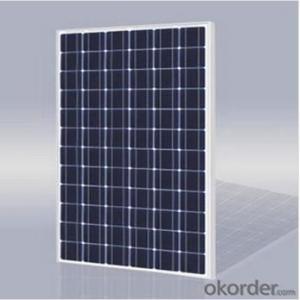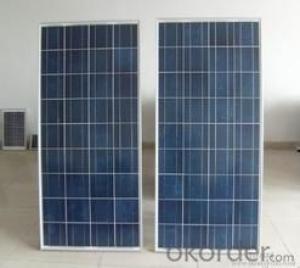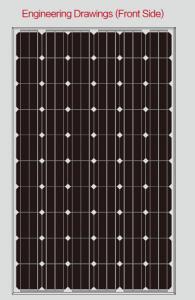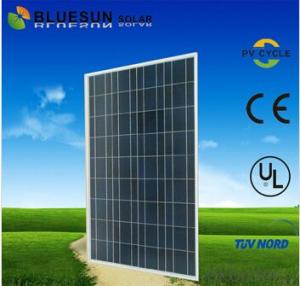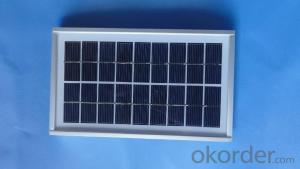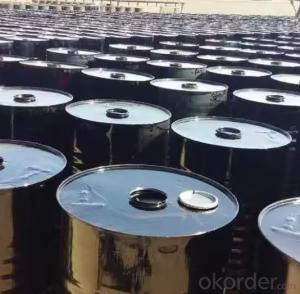Muticrystalline Solar Panel 155W A Grade For Commercial
- Loading Port:
- China main port
- Payment Terms:
- TT OR LC
- Min Order Qty:
- 1000 watt
- Supply Capability:
- 20000 watt/month
OKorder Service Pledge
OKorder Financial Service
You Might Also Like
Item specifice
Muticrystalline Solar Panel 155W A Grade For Commercial
Introduction
This is a kit using for factory and storage field. this product is a higher output version with stable power and we guarantee you for 20years.
A solar cell, or photovoltaic cell (in very early days also termed "solar battery"[1] – a denotation which nowadays has a totally different meaning, see here), is an electrical device that converts the energy of lightdirectly into electricity by the photovoltaic effect, which is a physical and chemical phenomenon.[2] It is a form of photoelectric cell, defined as a device whose electrical characteristics, such as current, voltage, or resistance, vary when exposed to light. Solar cells are the building blocks of photovoltaic modules, otherwise known as solar panels.
Solar cells are described as being photovoltaic irrespective of whether the source is sunlight or an artificial light. They are used as a photodetector (for example infrared detectors), detecting light or other electromagnetic radiation near the visible range, or measuring light intensity.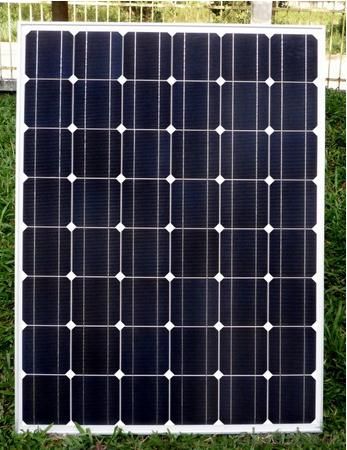
Suggested application
Home lighting business lighting,
Garden lighting, pavement lighting
Farmer household lighting
Product feature
modules are made of Monocrystalline or Polycrystalline Silicon cell.
Materials and color of the solar panel frame: Clear anodized aluminum alloy type 6063T5 Universal frame; Silver-white color;
The output connection gathers the coupling: Selects conforms to the IEC-612615; 2005, class II, IEC61730 international standard; Airtight waterproofing binding clamp;
Module seal structure: The surface is thick, the high diaphanous rate armored glass with solar cell board special-purpose 3.2mm becomes after the high temperature lamination craft. The back selects has waterproof and anti- aged performance fine TPT materials. The entire block battery board has, the waterproofing, the anti- aging airtight and so on the fine performance;
Power tolerance: +/-3%
Packaging
International standard cartons(according to the requirements of customers )
- Q:Can solar panels be used on boats or marine applications?
- Yes, solar panels can be used on boats and marine applications. They are a sustainable and efficient way to generate electricity, especially in areas with ample sunlight. Solar panels can be easily installed on the deck or roof of a boat, providing power for various onboard systems such as lighting, navigation equipment, and charging batteries. Additionally, solar panels help reduce reliance on fossil fuels and minimize the carbon footprint of marine activities.
- Q:I would like to know if I had a mobile kitchen could I power it from solar panels mounted atop the vehicle (truck).(to power electric kitchen equipment, i.e. stove, deep fryer.), instead of propane…could I possibly connect the solar panels to a battery to save my generated electricity? If solar panels would not be enough power could a small windmill suffice…?
- Nice enough idea you have there, but practical reality is waiting to bring you back to your senses. The appliances you want to operate take a lot of power. You would need an awful lot of solar cells or a very cumbersome windmill to provide sufficient energy for them. You will find that for a mobile kitchen, an ordinary generator running on gasoline or diesel will be much less expensive to buy and maintain, less trouble to haul around, and much easier to replace if necessary. Considering that propane will probably prove less expensive yet, go with that for as many appliances as possible.
- Q:I want to put a solar panel(s) on my roof. What components do I need besides the solar panels? solar power controller? wires? How do I hook it into my home's electrical system and about how much electricity could I generate and save? Would the panels pay for themselves over time? Any help will be appreciated. Thank you!
- The first thing that you have to realize is that solar panels only make DC currant. This is used to charge batteries which when hooked to an inverter will make 20 v. AC. You need a large bank of batteries and a heavy duty inverter to power your house. There is also an automatic switch that will send power back to the utility company when you have excess power available. This is not a small project. Really think this out before you invest a lot of money for nothing.
- Q:Can solar panels be installed on a sloped roof?
- Yes, solar panels can be installed on a sloped roof. In fact, many residential and commercial buildings with sloped roofs have successfully installed solar panels to generate renewable energy. The angle of the slope can affect the efficiency of the panels, but with proper installation and positioning, solar panels can still effectively harness sunlight and produce electricity.
- Q:I mean like bread is made of wheat, what are solar panels made up of?How are they manufactured?
- Solar panels (aka photovoltaic panel) are most often made up of thin wafers of crystalline silicon or cadmium telluride. As photons from the sun enter the photovoltaic cell, electrons are freed from the substrate when are then collected by wires that run throughout the panel. And as we know electrons=electricity!
- Q:i am trying to get it to work on solar power They are outdoors and we dont feel like running a few hundred feet of power cables. Thanks and best answer will get 0 points.
- Only okorder /... Each battery will will need to be enclosed in a box from the weather to preserve it as well as the charge controllers. All this work can be done with success, but will be costly if that's what you want, and want it done right. You have no short cuts around this unless you want to damage your cameras? I still say it would be much easier to run conduit under ground for your power supply to each camera, and it would cost less money and time.
- Q:I purchased some small 3.6 v 70mA solar panels online. I have no experience with solar panels. I am confident of the layout of the parallel circuit I want to create, however I don't know how to properly connect the tabs that come from the sides of the panels. Any help on connecting them?
- You must connect solar cells the same way you would connect a couple of batteries, in series. And you cannot connect any form of voltage source in parallel to one another, this doesn't work, if you need a specific drop in voltage from the cell, use a voltage regulator and some capacitors. Hope I helped.
- Q:i want to build a stationary model of a solar panel and i dont know if it is going to be too simple or not i also want ideas to make it betterplease criticism is allowedmy idea was to make a case, just like a real solar panel, and take plexiglass to make it. i want to add some models of photovoltaic cells that look like they are in a solar panel . i want to add the fake shoulderings as well . i want to make the case openable by hinges.i would like some of your thoughts and ideas to help me .thx
- The okorder /
- Q:Can I use a regulator from a car to regulate the voltage from a solar panel to a battery?
- solar panels will naturally produce a certain DC voltage which is what your battery needs - the current will vary based on the sun light. You need probably 4V to have some over voltage. So based on your specs look at having at least 4 V but not too much over that (tells you how many panels you need in series) I would have blocking diodes (probably the solar cell has them built in) to insure the battery does not discharge thru the panel.
- Q:Are there any aesthetic considerations when installing solar panels?
- Yes, there are aesthetic considerations when installing solar panels. The design and placement of solar panels should be mindful of the overall appearance of the building or property. Factors such as panel color, size, orientation, and integration with the existing structure are important to ensure that the solar panels blend well with the surroundings and do not compromise the visual appeal of the property.
1. Manufacturer Overview |
|
|---|---|
| Location | |
| Year Established | |
| Annual Output Value | |
| Main Markets | |
| Company Certifications | |
2. Manufacturer Certificates |
|
|---|---|
| a) Certification Name | |
| Range | |
| Reference | |
| Validity Period | |
3. Manufacturer Capability |
|
|---|---|
| a)Trade Capacity | |
| Nearest Port | |
| Export Percentage | |
| No.of Employees in Trade Department | |
| Language Spoken: | |
| b)Factory Information | |
| Factory Size: | |
| No. of Production Lines | |
| Contract Manufacturing | |
| Product Price Range | |
Send your message to us
Muticrystalline Solar Panel 155W A Grade For Commercial
- Loading Port:
- China main port
- Payment Terms:
- TT OR LC
- Min Order Qty:
- 1000 watt
- Supply Capability:
- 20000 watt/month
OKorder Service Pledge
OKorder Financial Service
Similar products
New products
Hot products
Related keywords
